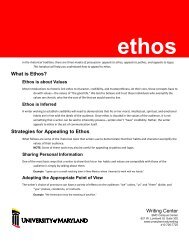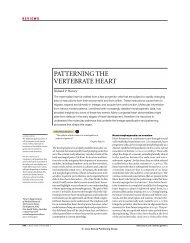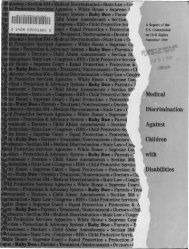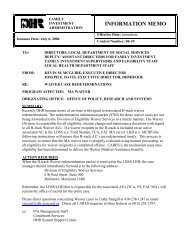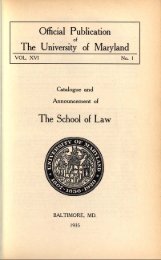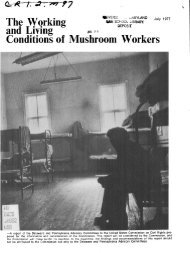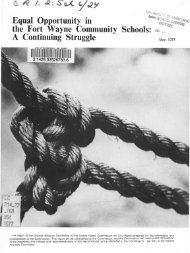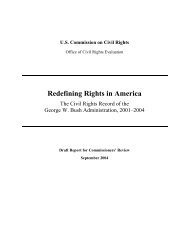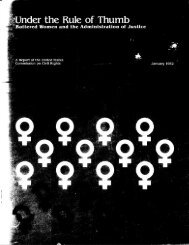Field Manual for 2013-2014 - University of Maryland School of ...
Field Manual for 2013-2014 - University of Maryland School of ...
Field Manual for 2013-2014 - University of Maryland School of ...
Create successful ePaper yourself
Turn your PDF publications into a flip-book with our unique Google optimized e-Paper software.
B. Advanced <strong>Field</strong> Practicum<br />
The second placement is referred to as the Advanced <strong>Field</strong> Practicum. This placement supports the<br />
concentration and specialization that the student chooses as the focus <strong>for</strong> his/her advanced study. The<br />
concentrations and specializations are described in sections C and D (below). Students doing their Advanced<br />
<strong>Field</strong> Practicum generally spend three full days a week (24 hours) at the field placement site. The student’s<br />
preference <strong>for</strong> a particular placement site is considered when arranging the placement. Advanced <strong>Field</strong><br />
Practicum begins in the Fall and continues through the Spring semester. There is a course outline and a<br />
student per<strong>for</strong>mance evaluation <strong>for</strong>m <strong>for</strong> each <strong>of</strong> the two concentrations.<br />
The only exception to the three days a week is the Extended <strong>Field</strong> Placement.<br />
Extended <strong>Field</strong> Placement<br />
A student applying <strong>for</strong> an Advanced <strong>Field</strong> Practicum may request an extended field placement which<br />
requires him/her to be in a field placement two days a week from the beginning <strong>of</strong> the semester to the<br />
end <strong>of</strong> July. The request is to be made to (and must be approved by) the <strong>Field</strong> Office. The learning<br />
objectives <strong>for</strong> the extended placement remain the same. Once a student has begun a placement based<br />
upon this model he/she will not be allowed to shift to the three-day a week model. Students who<br />
choose this field placement model follow a different <strong>Field</strong> Education Calendar (<strong>Field</strong> Education<br />
Calendars are found on the field web site). Grading, <strong>for</strong> example, is on a different timetable. The<br />
extended student receives both the fall and spring semester grades later than the other field students<br />
and will receive his/her diploma in July rather than May.<br />
The availability <strong>of</strong> an extended placement is dependent upon agency resources. There are some<br />
agencies that will not accept an advanced placement student who is requesting an extended placement<br />
because the nature <strong>of</strong> their service delivery models and the needs <strong>of</strong> their client populations require<br />
the student to be in placement three days <strong>of</strong> the week.<br />
Course Requirements to Support the Advanced <strong>Field</strong> Practicum:<br />
Advanced Practice builds on the foundation curriculum. Students must take two (2) consecutive<br />
semesters <strong>of</strong> Advanced Practicum <strong>for</strong> a total <strong>of</strong> twelve (12) credits. In conjunction with <strong>Field</strong> Education,<br />
students are required to take a Methods Option course each semester that they are in the field. The<br />
Methods Option requirements are specific to the concentrations and specializations. Students should<br />
consult the Student Handbook and meet with their academic advisors to be certain that they are<br />
fulfilling the requirements <strong>of</strong> their concentration and specialization.<br />
C. Concentrations<br />
Advanced Practicum students are placed in settings that support their choice <strong>of</strong> primary concentration only.<br />
The following concentrations are <strong>of</strong>fered:<br />
Clinical<br />
The Clinical concentration prepares students to provide direct service to individuals, families, and small<br />
groups in order to improve their quality <strong>of</strong> life and enhance their social functioning and to work with<br />
organizations and/or aspects <strong>of</strong> the community that have a direct impact on their lives. Clinical social<br />
workers are active in the promotion, restoration, maintenance and enhancement <strong>of</strong> the functioning <strong>of</strong><br />
their clients and client systems, and the prevention <strong>of</strong> distress and provision <strong>of</strong> resources.<br />
Management and Community Organization (MACRO)<br />
The Management and Community Organization concentration prepares students <strong>for</strong> a wide and diverse<br />
10



